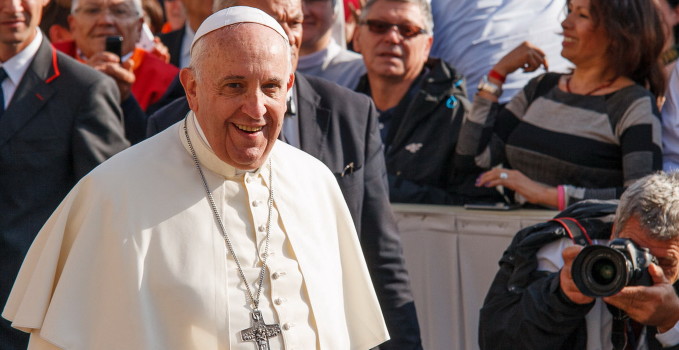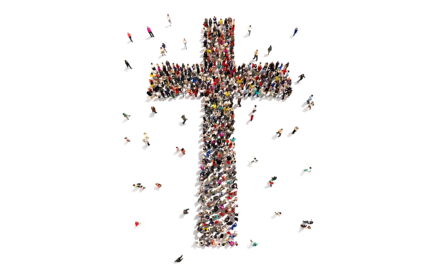In his general audiences on the third and fourth Wednesdays in April in St. Peter’s Square in the middle of spring before several thousand Catholics and pilgrims from many countries, Pope Francis dedicated his catechesis to the differences and complementariness between men and women, upon which marriage and family is based, and supported by the grace of God.
The family: male and female (1)
Dear Brothers and Sisters, Good morning!
Today’s catechesis is dedicated to an aspect central to the theme of the family: the great gift that God gave to humanity with the creation of man and woman and with the sacrament of marriage. This catechesis and the next one will treat the difference and complementarity between man and woman, who stand at the summit of divine creation; then the two after that will be on other topics concerning marriage.
Let us begin with a brief comment on the first narrative of creation, in the Book of Genesis. Here we read that God, after having created the universe and all living beings, created his masterpiece, the human being, whom He made in his own image: “in the image of God he created them; male and female he created them” (Gn 1:27), so says the Book of Genesis.
And as we all know, sexual difference is present in so many forms of life, on the great scale of living beings. But man and woman alone are made in the image and likeness of God: the biblical text repeats it three times in two passages (26-27): man and woman are the image and likeness of God. This tells us that it is not man alone who is the image of God or woman alone who is the image of God, but man and woman as a couple who are the image of God. The difference between man and woman is not meant to stand in opposition, or to subordinate, but is for the sake of communion and generation, always in the image and likeness of God.
Experience teaches us: in order to know oneself well and develop harmoniously, a human being needs the reciprocity of man and woman. When that is lacking, one can see the consequences. We are made to listen to one another and help one another. We can say that without the mutual enrichment of this relationship — in thought and in action, in affection and in work, as well as in faith — the two cannot even understand the depth of what it means to be man and woman.
Modern contemporary culture has opened new spaces, new forms of freedom and new depths in order to enrich the understanding of this difference. But it has also introduced many doubts and much skepticism. For example, I ask myself, if the so-called gender theory is not, at the same time, an expression of frustration and resignation, which seeks to cancel out sexual difference because it no longer knows how to confront it. Yes, we risk taking a step backwards. The removal of difference in fact creates a problem, not a solution. In order to resolve the problems in their relationships, men and women need to speak to one another more, listen to each other more, get to know one another better, love one another more. They must treat each other with respect and cooperate in friendship. On this human basis, sustained by the grace of God, it is possible to plan a lifelong marital and familial union. The marital and familial bond is a serious matter, and it is so for everyone not just for believers. I would urge intellectuals not to leave this theme aside, as if it had to become secondary in order to foster a more free and just society.
God entrusted the earth to the alliance between man and woman: its failure deprives the earth of warmth and darkens the sky of hope. The signs are already worrisome, and we see them. I would like to indicate, among many others, two points that I believe call for urgent attention.
The first. There is no doubt that we must do far more to advance women, if we want to give more strength to the reciprocity between man and woman. In fact, it is necessary that woman not only be listened to more, but that her voice carry real weight, a recognized authority in society and in the Church. The very way Jesus considered women in a context less favourable than ours, because women in those times were relegated to second place. Jesus considered her in a way which gives off a powerful light, which enlightens a path that leads afar, of which we have only covered a small stretch. We have not yet understood in depth what the feminine genius can give us, what woman can give to society and also to us. Maybe women see things in a way that complements the thoughts of men. It is a path to follow with greater creativity and courage.
A second reflection concerns the topic of man and woman created in the image of God. I wonder if the crisis of collective trust in God, which does us so much harm, and makes us pale with resignation, incredulity and cynicism, is not also connected to the crisis of the alliance between man and woman. In fact the biblical account, with the great symbolic fresco depicting the earthly paradise and original sin, tells us in fact that the communion with God is reflected in the communion of the human couple and the loss of trust in the heavenly Father generates division and conflict between man and woman.
The great responsibility of the Church, of all believers, and first of all of believing families, which derives from us, impels people to rediscover the beauty of the creative design that also inscribes the image of God in the alliance between man and woman. The earth is filled with harmony and trust when the alliance between man and woman is lived properly. And if man and woman seek it together, between themselves, and with God, without a doubt they will find it. Jesus encourages us explicitly to bear witness to this beauty, which is the image of God.
The family: Male and female (II)
Dear Brothers and Sisters,
In the preceding catechesis on the family, I meditated on the first narrative of the creation of the human being, in the first chapter of Genesis, where it is written: “God created man in his own image, in the image of God he created him; male and female he created them” (1:27).
Today, I would like to complete the reflection with the second narrative, which we find in the second chapter. Here we read that the Lord, after having created heaven and earth, “formed man of dust from the ground, and breathed into his nostrils the breath of life; and man became a living being” (2:7). This is the culmination of creation. But something is missing: then God places man in the most beautiful garden that he might cultivate and look after it (cf. 2:15).
The Holy Spirit, who inspired the whole of the Bible, momentarily evokes the image of man alone — something is missing — without woman. And the Holy Spirit evokes God’s thoughts, even His emotion, as He gazes at Adam, observing him alone in the garden. He is free, he is a lord… but he is alone. And God sees that this “is not good”: as if what is missing is communion, he lacks communion, the fullness is lacking. “It is not good” , God says, and adds: “I will make him a helper fit for him” (2:18).
And so God brings all the animals to man; man gives to each its name — and this is another image of man’s dominion over creation — but he sees that not one of the animals is like himself. Man continues alone. When finally God presents woman, man exultantly recognizes that this creature, and this creature alone, is a part of him: “bone of my bones and flesh of my flesh” (2:23). Finally, there is a reflection, a reciprocity. When a person — to give an example to help us understand — wants to shake hands with another, he must have that person before him: if he holds out his hand and no one is there… his hand remains outstretched, there is no reciprocity. This was how man was, he lacked something to reach his fullness; reciprocity was lacking. Woman is not a replica of man; she comes directly from the creative act of God. The image of the “rib” in no way expresses inferiority or subordination, but, on the contrary, that man and woman are of the same substance and are complimentary and that they also have this reciprocity. And the fact that — also in that parable — God moulds woman while man sleeps means precisely that she is in no way man’s creation, but God’s. He also suggests another point: in order to find woman — and we could say to find love in woman — man first must dream of her and then find her. God’s faith in man and in woman, those to whom he entrusted the earth, is generous, direct and full. He trusts them. But then the devil introduces suspicion into their minds, disbelief, distrust, and finally, disobedience to the commandment that protected them. They fall into that delirium of omnipotence that pollutes everything and destroys harmony. We too feel it inside of us, all of us, frequently.
Sin generates distrust and division between man and woman. Their relationship will be undermined by a thousand forms of abuse and subjugation, misleading seduction and humiliating ignorance, even the most dramatic and violent kind. And history bears the scar. Let us think, for example, of those negative excesses of patriarchal cultures. Think of the many forms of male dominance whereby the woman was considered second class. Think of the exploitation and the commercialization of the female body in the current media culture. And let us also think of the recent epidemic of distrust, skepticism, and even hostility that is spreading in our culture — in particular an understandable distrust from women — on the part of a covenant between man and woman that is capable, at the same time, of refining the intimacy of communion and of guarding the dignity of difference.
If we do not find a surge of respect for this covenant, capable of protecting new generations from distrust and indifference, from children coming into the world ever more uprooted from the mother’s womb. The social devaluation for the stable and generative alliance between man and woman is certainly a loss for everyone. We must return marriage and the family to the place of honour! The Bible says something beautiful: man finds woman, they meet and man must leave something in order to find her fully. That is why man will leave his father and mother to go to her. It’s beautiful! This means setting out on a new path. Man is everything for woman and woman is everything for man.
The responsibility of guarding this covenant between man and woman is ours, although we are sinners and are wounded, confused and humiliated, discouraged and uncertain; it is nevertheless for us believers a demanding and gripping vocation in today’s situation. The same narrative of creation and of sin ends by showing us an extremely beautiful icon: “The Lord God made for Adam and for his wife garments of skins, and clothed them” (Gen 3:21). It is an image of tenderness towards the sinful couple that leaves our mouths agape: the tenderness God has for man and woman! It’s an image of fatherly care for the human couple. God himself cares for and protects his masterpiece.














